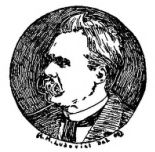
EARLY GREEK PHILOSOPHY & OTHER ESSAYS
By
FRIEDRICH NIETZSCHE
TRANSLATED BY
MAXIMILIAN A. MÜGGE
AUTHOR OF "FR. NIETZSCHE, HIS LIFE AND WORK," ETC.

The Complete Works of Friedrich Nietzsche
The First Complete and Authorised English Translation
Edited by Dr Oscar Levy
Volume Two
T.N. FOULIS
13 & 15 FREDERICK STREET
EDINBURGH: AND LONDON
1911
CONTENTS
TRANSLATOR'S PREFACE
1. THE GREEK STATE
—Preface to an unwritten book(1871)
2. THE GREEK WOMAN
—Fragment (1871)
3. ON MUSIC AND WORDS
—Fragment (1871)
4. HOMER'S CONTEST
—Preface to an unwritten book (1872)
5. THE RELATION OF SCHOPENHAUER'S PHILOSOPHY TO A GERMAN CULTURE
—Preface to an unwritten book (1872)
6. PHILOSOPHY DURING THE TRAGIC AGE OF THE GREEKS (1873)
7. ON TRUTH AND FALSITY IN THEIR ULTRAMORAL SENSE (1873)
TRANSLATOR'S PREFACE
The essays contained in this volume treat of various subjects. Withthe exception of perhaps one we must consider all these papers asfragments. Written during the early Seventies, and intended mostly asprefaces, they are extremely interesting, since traces of Nietzsche'slater tenets—like Slave and Master morality, the Superman—can befound everywhere. But they are also very valuable on account of theyoung philosopher's daring and able handling of difficult and abstrusesubjects. "Truth and Falsity," and "The Greek Woman" are probably thetwo essays which will prove most attractive to the average reader.
In the essay on THE GREEK STATE the two tenets mentioned aboveare clearly discernible, though the Superman still goes by theSchopenhauerian label "genius." Our philosopher attacks the modernideas of the "dignity of man" and of the "dignity of labour," becauseExistence seems to be without worth and dignity. The preponderanceof such illusory ideas is due to the political power nowadays vestedin the "slaves." The Greeks saw no dignity in labour. They saw thenecessity of it, and the necessity of slavery, but felt ashamed ofboth. Not even the labour of the artist did they admire, although theypraised his completed work.
If the Greeks perished through their slavery, one thing is still morecertain: we shall perish through the lack of slavery. To the essenceof Culture slavery is innate. It is part of it. A vast multitude mustlabour and "slave